Request Information
We're Sorry
There was an unexpected error with the form (your web browser was unable to retrieve some required data from our servers). This kind of error may occur if you have temporarily lost your internet connection. If you're able to verify that your internet connection is stable and the error persists, the Franklin University Help Desk is available to assist you at helpdesk@franklin.edu, 614.947.6682 (local), or 1.866.435.7006 (toll free).
Just a moment while we process your submission.

Types of Master’s in Education Degrees: Which Will Be Most Valuable for You?
Earning a master’s degree in education is a popular step for educators who want to advance their careers. More than 56% of school teachers have a master’s degree or higher, according to the National Teacher and Principal Survey (NTPS) report from the U.S. Department of Education.
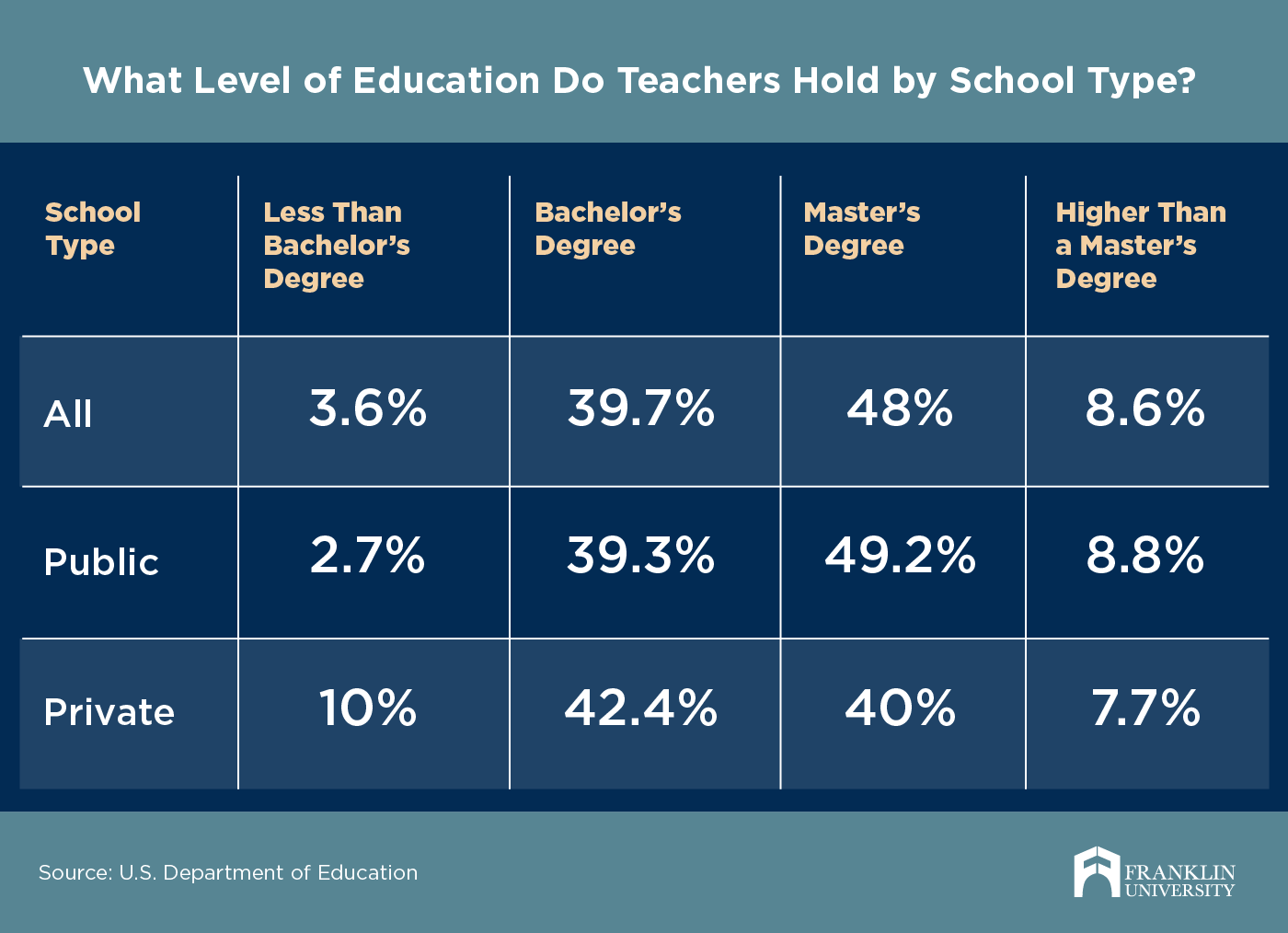
Not only will an advanced degree in education help you improve your skills as an educator and potentially make a more significant impact on your students’ lives, but it also can lead to a pay increase and help you move into a leadership position. The National Council on Teacher Quality found that 88% of large school districts offer additional pay to teachers with master’s degrees.
A master’s degree in education also is valuable because you can:
- Strengthen your position in the competitive job market.
- Gain an additional subject in which you’re certified or licensed. This can help you fill a teaching gap or qualify for more specialized teaching areas or a more in-demand position, such as special education, English Language Learner (ELL) or math teacher.
- Maintain your license. Some states (Maryland and New York, for example) require a master’s degree to advance or maintain your teaching certificate.
- Move into a leadership or administration position. Many mid- and senior-level positions require a master’s degree to be considered.
There are many types of master’s degrees in education. The right one for you will depend on your goals and area of interest. This article will help you understand the four main types of degrees so you know your options.
4 Types of Master’s in Education Degrees
There are four main types of degrees: Master of Education (M.Ed.), Master of Arts in Education (M.A. Ed.), Master of Science in Education (M.S. Ed.) and Master of Arts in Teaching (MAT). The type of degree offered by a university sometimes depends on how the school designates it internally and for accreditors, which means a Master of Arts in Education at one institution might be called a Master of Science in Education at another.
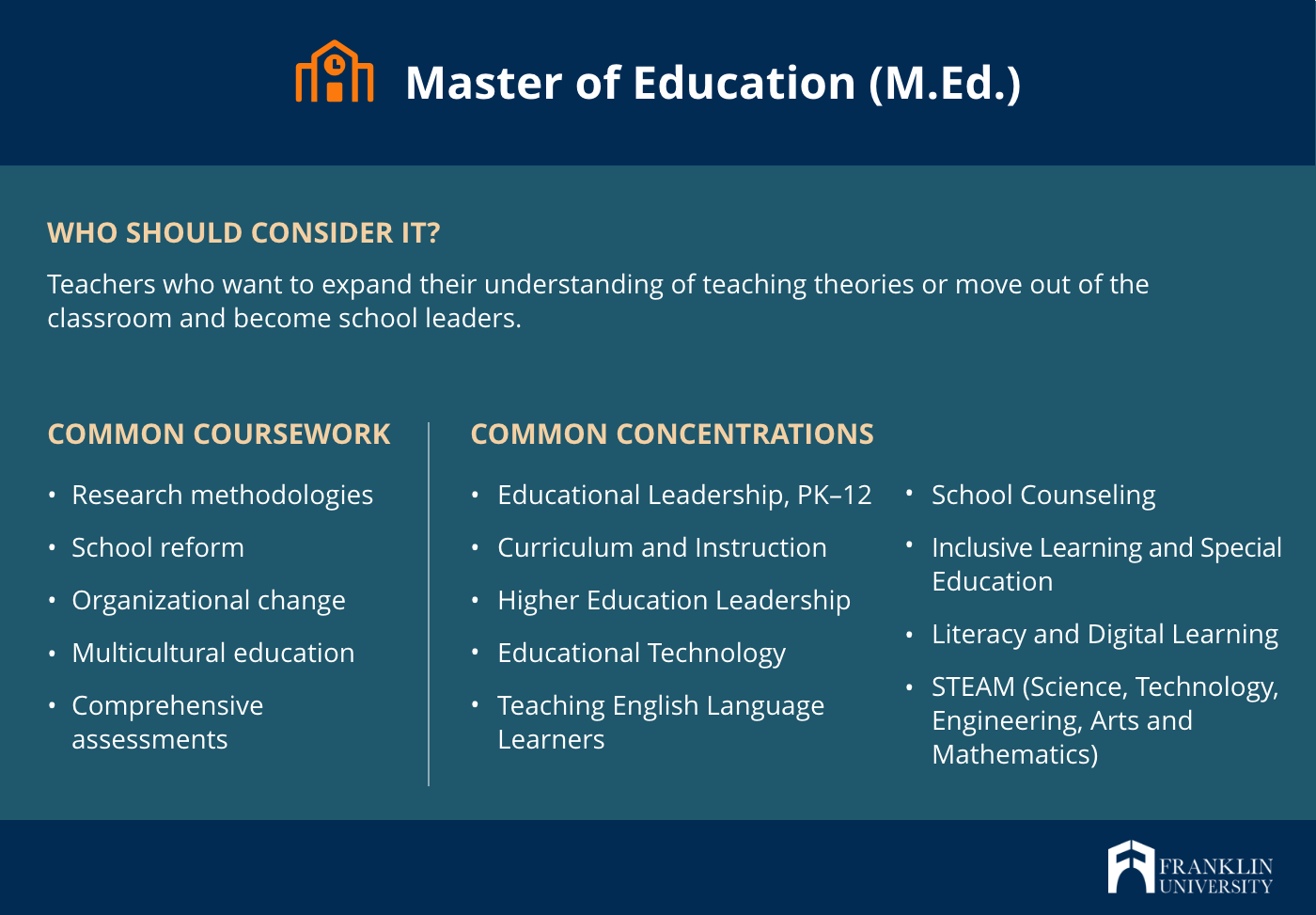
Master of Education (M.Ed.)
This degree program often focuses on practical, field-based experience to help you understand and evaluate education practices. Specific courses vary by concentration, but coursework generally will cover such topics as instructional design, differentiated learning, instructional theories, educational best practices, education research, educational leadership and education policy and reform. M.Ed. programs are also frequently designed to provide the flexibility needed for full-time teachers to be able to continue teaching while pursuing their degrees.
Who It’s For
This is geared toward teachers who want to expand their understanding of teaching theories, strategies and pedagogy, and those who want to move out of the classroom and become school principals, curriculum designers, school counselors or even corporate trainers.
Concentrations or Specializations
- They vary by institution but can include:
- Educational Leadership, PK–12
- Curriculum and Instruction
- Higher Education Leadership
- Educational Technology
- Teaching English Language Learners
- School Counseling
- Inclusive Learning and Special Education
- Literacy and Digital Learning
- STEAM (Science, Technology, Engineering, Arts and Mathematics)
Get a FREE education career action plan filled with resources and recommendations from those who are already there.
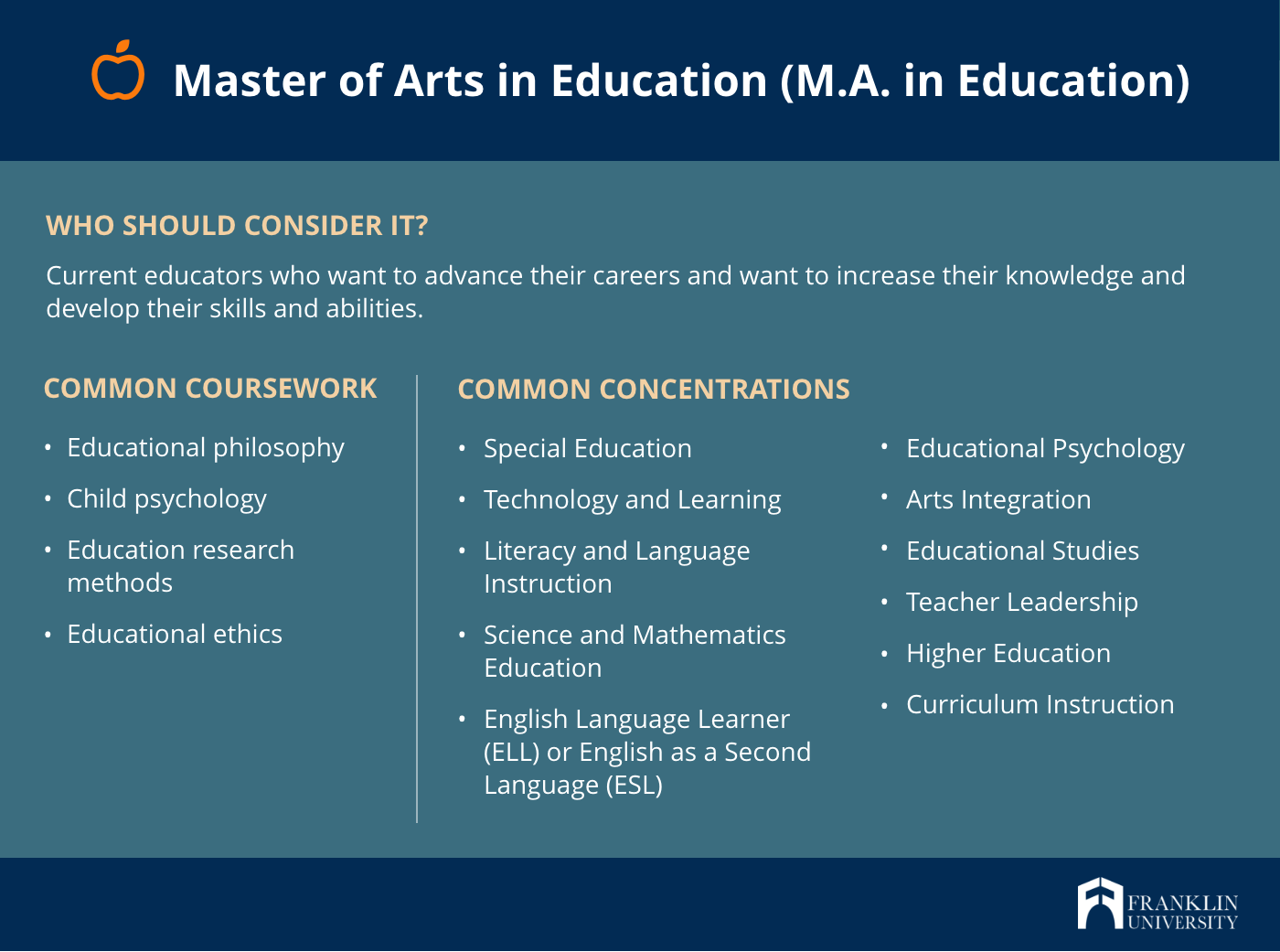
Master of Arts in Education (M.A. in Education)
When enrolled in Master of Arts in Education programs, students gain advanced knowledge about education and a particular subject, such as math, English or history. Coursework may include curriculum development, education theory and educational research in the content area.
Who It’s For
Current educators who want to develop both depth and breadth in their studies, including focusing on the theoretical and scholarly aspects of education. They often go on to pursue instructional or administrative careers in education.
Concentrations or Specializations
- These vary by school but can include:
- Special Education
- Technology and Learning
- Literacy and Language Instruction
- Science and Mathematics Education
- English Language Learner (ELL) or English as a Second Language (ESL)
- Educational Psychology
- Arts Integration
- Educational Studies
- Teacher Leadership
- Higher Education
- Curriculum Instruction
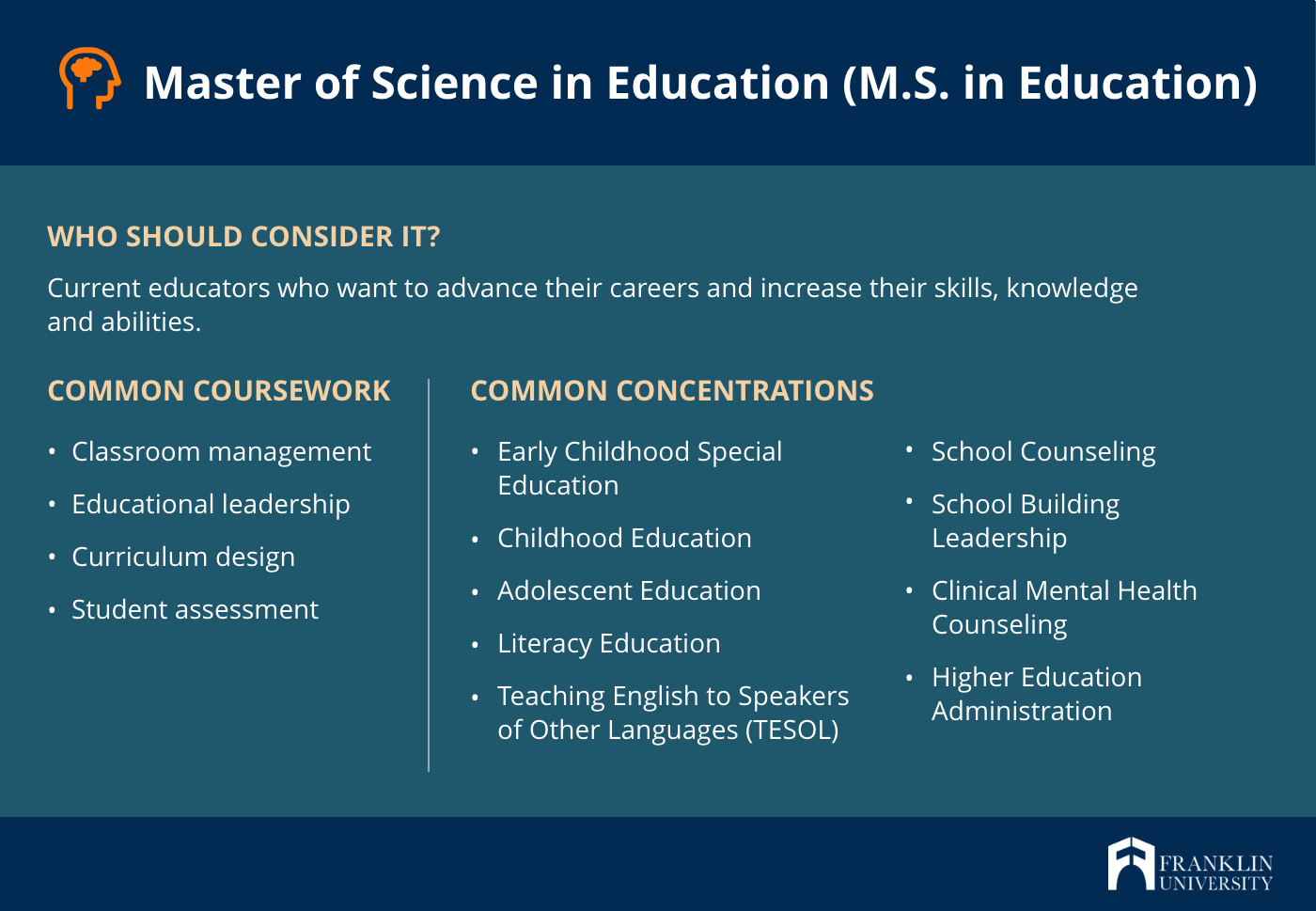
Master of Science in Education (M.S. in Education)
A Master of Science in Education program, like a Master of Arts in Education program, combines courses in the concentration’s content area with classes in teaching methods that will help degree seekers understand the pedagogical approaches they need to be effective classroom teachers.
Who It’s For
Current educators who are interested in research and technical expertise and those whose career goals require both practical knowledge and expertise in research, quantitative methods, and qualitative analysis. Often these degree holders become researchers, policymakers, curriculum developers or administrators.
Concentrations or Specializations
- These vary by school but can include:
- Early Childhood Special Education
- Childhood Education
- Adolescent Education
- Literacy Education
- Teaching English to Speakers of Other Languages (TESOL)
- School Counseling
- School Building Leadership
- Clinical Mental Health Counseling
- Higher Education Administration
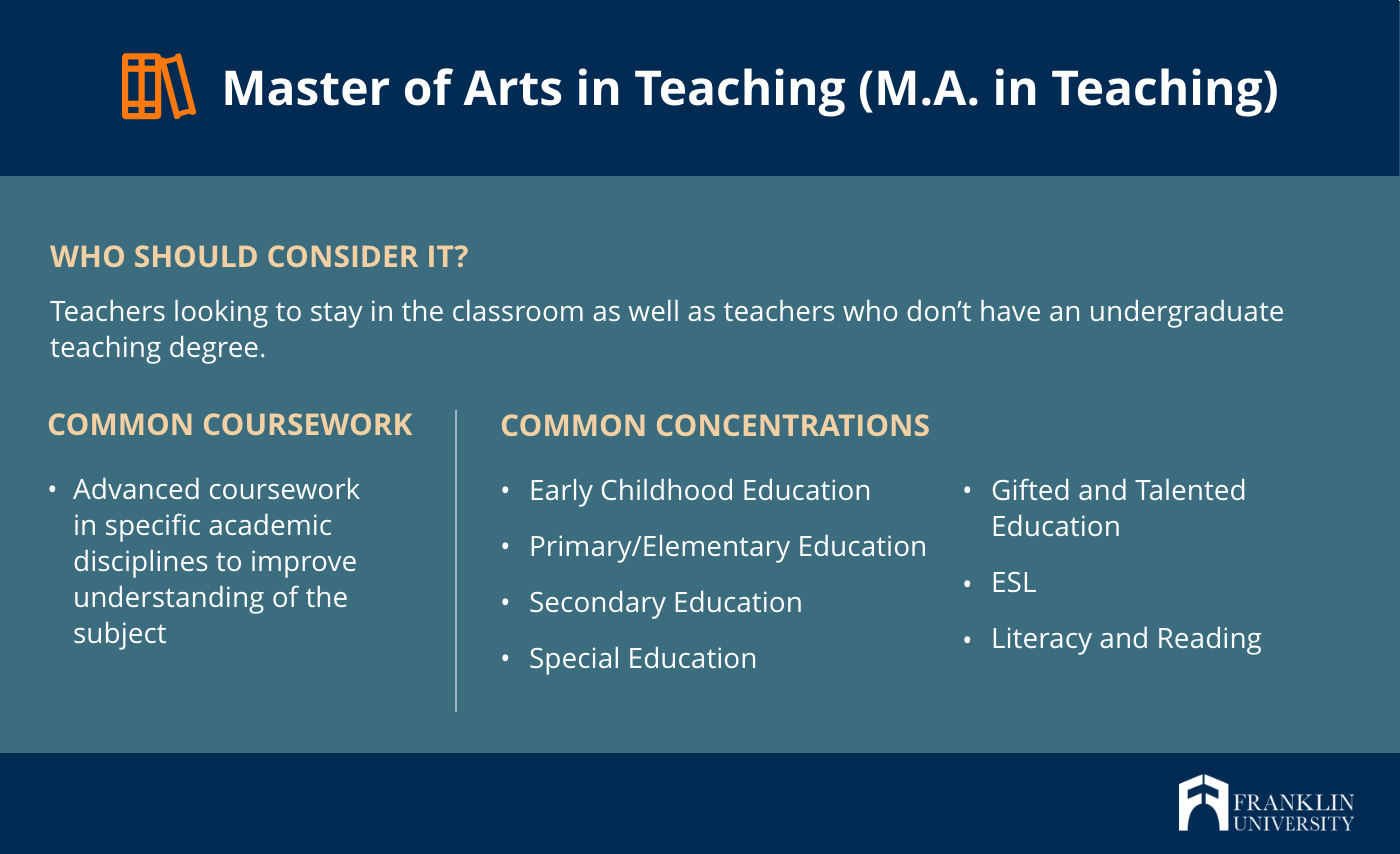
Master of Arts in Teaching (M.A. in Teaching)
M.A. in Teaching programs equip students with the foundational knowledge, hands-on field experience and teaching strategies needed to be effective in the classroom. They provide a combination of theoretical courses – leadership in classrooms, instructional design, student development – and practical work, including student teaching and research.
Who It’s For
The Master of Arts in Teaching (M.A. in Teaching) degree satisfies the needs of individuals who don’t have an undergraduate teaching degree but want to teach and need practical hands-on skills and experience. It’s also an option for teachers who want to stay in the classroom and advance their teaching careers by focusing on practical skills and subject-specific content.
Concentrations or Specializations
- An M.A. in Teaching can be in any area in which a teaching degree can be earned as well as in specialties such as:
- Early Childhood Education
- Primary/Elementary Education
- Secondary Education
- Special Education
- Gifted and Talented Education
- English as a Second Language (ESL)
- Literacy and Reading
How Valuable is a Master’s Degree in Education?
How much more money will you make with a master’s degree? The National Council on Teacher Quality determined that a master's degree earns teachers, on average, an additional $2,760 in their first year of teaching compared to a bachelor's degree. This salary advantage increases to an average of $7,358 annually by the time a teacher reaches the maximum point on the pay scale.
The U.S. Bureau of Labor Statistics also reports a high payoff for a master’s degree in education: The highest percentage wage premium goes to education administrators: They earn 44% more than those with bachelor’s degrees. Preschool and kindergarten teachers with master’s degrees make 43% more than those with bachelor’s degrees, and elementary and secondary school teachers earn 28% and 24% more, respectively.
How to Know Which Master’s Degree in Education Is Right for You?
When prospective students ask Dr. Brett Tozer, chair of the School of Education at Franklin University, for advice on choosing a master’s degree and concentration, he advises them to consider how they’ll be able to leverage the master’s to advance their career.
"If you envision yourself staying in the classroom as a teacher, then an M.A. in Teaching or an M.Ed. with a specialization in curriculum instruction could be programs to strongly consider," Tozer says. "If you're interested in pursuing a leadership role or a role in administration, where you'll be making decisions with larger groups of stakeholders, then an M.Ed. in Educational Leadership is a path worth considering."
To decide which master’s degree in education you should pursue, ask yourself these five questions:
- What are your career goals? Consider your career aspirations and what you want to accomplish. You don’t have to know your end goal, but think about the stepping-stone goal of where you see yourself in five years. Do you want to be an instructional coach? Dean of students? School counselor? Higher ed administrator?
- How can you use the master’s degree to advance your career? Research the jobs you aspire to and see the qualifications and skills employers seek. Is a master’s degree required? Will the degree give you credentials that help you stand out when a position opens?
- What will your focus, or concentration, be? Think about how you want to focus your studies. What areas of concentration or specialization will help you achieve your goals? If you aren’t sure, research the roles you’re interested in to determine what kind of degree is required.
- Does the college or university’s education program align with your goals? Research the programs you’re interested in to see if they meet your career objectives. If your goal is to advance in early childhood education, does the program you’re considering offer that concentration?
- Does the education program fit your life? If the program has the specialty area you’re interested in, the next question is whether it fits what you’re doing now. Does it offer classes on Saturday or in the evenings so you can attend while you continue to work? Or do the courses require you to be physically present, whether remotely or in-person, during the day, which isn’t as conducive for people who are teaching in a classroom.
Earning a master’s degree in education demonstrates to employers that you’re committed to your craft. It gives you the credentials and experience that can help you advance on your career path–and often provides a pay bump.
Franklin University’s Master of Education in Educational Leadership is predominately for people who want to move out of the classroom. It offers a focus area in higher education and another in K-12 building-level leadership. During the program, you’ll learn about such topics as the principles of educational leadership, leadership theory, leading curricular and instructional alignment, and critical issues in education and community relations. The flexible degree program is ideal for working educators because it enables them to take courses while continuing to teach.
Learn more about the Master of Education in Educational Leadership program.





